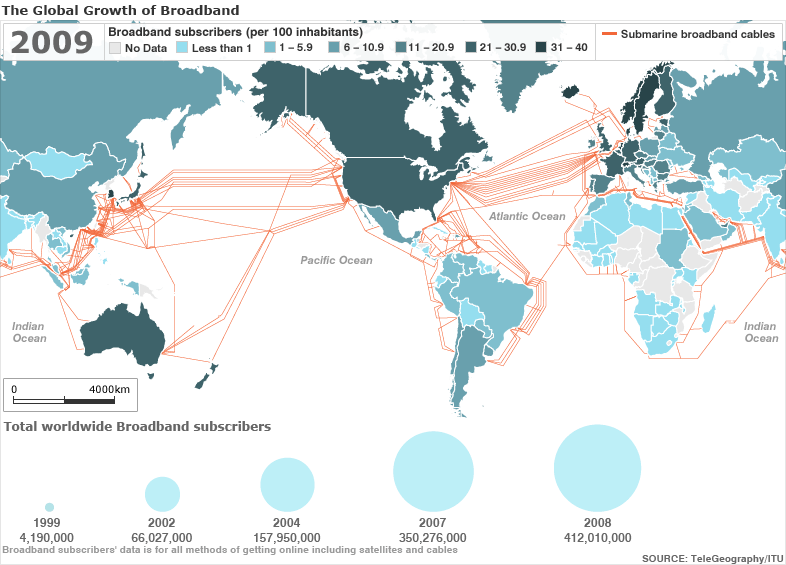The BBC has had a number of interesting, and at times conflicting articles about connectivity across the African continent. The first article that caught my eye was one about a pigeon being able to deliver information faster than the local ADSL service provider. The contest matched a pigeon carrying a 4 GB USB 60 miles, against a download of the same amount of information. The pigeon completed the task in 2 hours, at which time only 4% of the data had been downloaded.
Today there was another article about the technical aspects of high-speed underwater cables that are beginning to bring faster connectivity to various countries in Africa. This new development is also expected to reduce the cost of internet usage. And to help put this development in perspective, here’s a map that charts out the development of connectivity around the world. Notice that even when the map reaches 2009 there are still a lot of service gaps across Africa, and these are predicted to continue in the new future.
Finally to give these stories a more “human” aspect, the BBC gathered a number of interviews about the effect of this new service. Here you’ll find stories of a web consultant based in Kenya who says the current services allow her to work with clients across Europe, a farmer also in Kenya who was able to figure out what was killing his potatoes’ crop after running a few searches on Google, and a doctor in Tanzania who explains that fast internet allows him to collaborate with other medical professionals around the world.
En estos últimos días la BBC ha tenido una serie de artículos interesantes (y a veces contradictorios) sobre la conectividad en todo el continente africano. El primer artículo que me llamó la atención fue un artículo sobre como una paloma pudo entregar información más rápido que el proveedor local de servicio de ADSL. La competencia enfrento a paloma cargando un USB de 4 GB a lo largo de 60 millas, junto con una descarga de la misma cantidad de información. La paloma completo la tarea en 2 horas, momento en el que sólo el 4% de los datos se habían descargado.
Hoy hubo otro artículo sobre los aspectos técnicos de los cables submarinos de alta velocidad que están empezando a agilizar la conectividad en varios países de África. Este nuevo desarrollo también se espera reducirá el costa de uso de Internet. Y para ayudar a poner este desarrollo en perspectiva, aquí hay un mapa que traza el desarrollo de la conectividad en todo el mundo. Observe que incluso cuando el mapa llega al 2009 todavía hay una gran cantidad de deficiencias de estos servicios a través de África, además se prevé que continúe en el futuro cercano.
Por último, y para darle a estas historias un aspecto más “humana” la BBC reunió una serie de entrevistas sobre el efecto de este nuevo servicio. Aquí encontrará historias de una consultora de la web, basada en Kenia que dice que los servicios actuales le permiten trabajar con clientes por toda Europa, un agricultor también de Kenia, que fue capaz de averiguar lo que estaba matando a su cosecha de papas después de ejecutar unas cuantas búsquedas en Google, y un doctor, en Tanzania, que explica que la rapidez del Internet le permite colaborar con otros profesionales médicos en todo el mundo.
